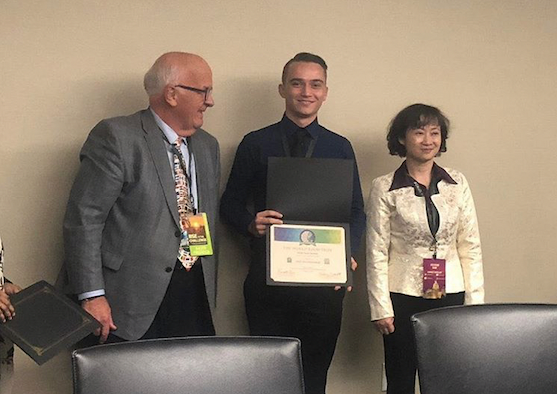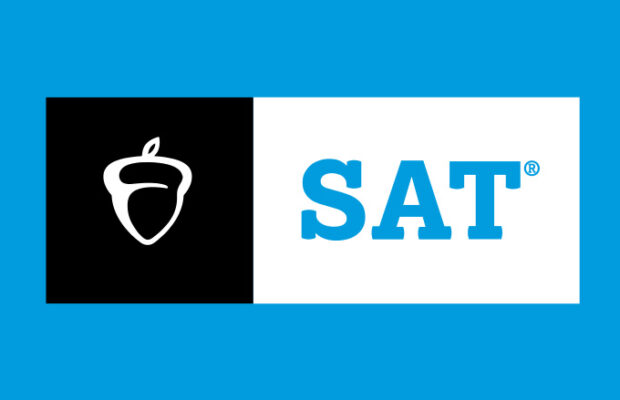Students address hunger through World Food Prize

Junior Andy Mustedanagic presents his research essay that includes research and solutions to food insecurity issues in Spain at the Global Youth Institute in Des Moines.
Last year in advanced placement environmental science (APES) science teacher Jason Lang had his students write a research essay about food scarcity issues that take place in countries around the world. Lang submitted these essays to the World Food Prize State Youth Institute in hopes that some of his students will be selected to attend the symposium at the Hilton Coliseum. Junior Andy Mustedanagic’s and senior Maya Gabriele’s and college freshman Payton Wagemon’s essays were selected among others Iowa students, so they were invited to attend the one day symposium on April 30 of this year.
The students at the symposium presented their essays to a small group of eight students and two adults at the symposium. The students were judged on their poise and tested on their knowledge of the chosen topic. The exceptional students were chosen to attend the World Food Prize Global Youth Institute in Des Moines.
Mustedanagic was one of the 200 exceptional students from 10 different countries and 27 different states to be selected from the State Youth Institutes to attend the Global Youth Institute based on the reading of his essay.
“The key thing about Andy’s essay and the essays of others that attended the youth institute is that the papers offered clear and viable solutions to the problem of feeding the ever growing human population,” Lang said. “Students chose a single country to focus on, and the best papers involved educating and engaging the poorest members of the society to create change from the bottom up. Andy had to learn about the culture and economic situation of the people that are most affected by food insecurity to think of the best solutions possible that would have the greatest impact.”
On October 18 of this year, Lang and Mustedanagic traveled to Des Moines to attend the three day long event to learn about pressing food security and agricultural issues with international experts. At the symposium, students and their teachers listened to speakers and participated in activities. “My favorite part was just the learning experience,” Mustedanagic said. “We did one activity where they put in proportion of how people eat. They had all the students that were there at the Global Youth Institute, they had 50 percent of them sit on the floor, and for dinner, they got a bowl of rice, and another 30 to 35 percent sat chairs, and for dinner, they got a bowl of rice with beans, and the remaining students got nice dining, basically full celebrity treatment of food and dining and everything. That was to put into perspective this percent of the world can barely get food and this is what they eat every day and this percent get this. ”
Mustedanagic has always had dreams of being an engineer, but after attending the symposium, he has been seriously thinking more about ending food scarcity. Specifically, Mustedanagic said he would want to work on developing new tools and technology that can be given to poor farmers to grow food to help end the problem of food scarcity.
To dive deeper into his new passion of ending food scarcity, Mustendanagic is applying for the Borlaug-Ruan International Internship. The internship provides high school students with an “all-expenses-paid, eight-week, hands-on experience, working with world-renowned scientists and policy makers at leading research centers around the globe,” he said. The internship has sent students like Mustedanagic to some of the top agricultural research centers and institutions in Africa, Asia, Latin America and the Middle East, including Bangladesh, Brazil, China, Costa Rica, Egypt, Ethiopia, Guatemala, India, Indonesia, Kenya, Malaysia, Mexico, Nepal, Peru, Philippines, Taiwan, Tanzania, Thailand, Trinidad and Tobago, and Turkey. Mustedanagic said he hopes to go to Spain to end food scarcity issues through engineering. “I find Spain as somewhere I have always wanted to go, and that’s what I did my research paper on. I’d love to go there and see if I could solve any problems there,” he said.
Lang said he believes that others at the high school have the ability to follow their passion to end hunger like Mustedanagic did. “I was also happy because I know his willingness to participate in this experience will open the doors to others at Cedar Falls High School to become the next generation of hunger fighters that our world needs. The problem of world hunger is not just a scientific one. We need people with an incredible skill set to cause change. I think there are a significant number of students at Cedar Falls with the skills needed to address this problem in the future,” Lang said.
Other Perspectives from State Youth Institute attendees
“I wouldn’t say it was attending the conference. It was more the process of writing the essay. I picked Morocco and water quality there, so I learned about that. I also learned about all these different solutions for water quality, like desalination and reverse mitosis. Probably the best part was receiving feedback from people who are knowledgeable and actually know about these issues,” junior Maya Gabrielle said.
“Writing my essay and choosing my topic not only opened up my eyes to the variety of problems around the world but to the complexity to each and every one of them. Trying to find a possible solution to such a problem requires more than a quick fix. I learned just how important and unique each situation is and was astounded by all the people passionate about global change. I was not expecting Hilton Coliseum to be full with so many hopeful, educated students wanting to share their ideas,” college freshman Payton Wageman said.









You must be logged in to post a comment Login